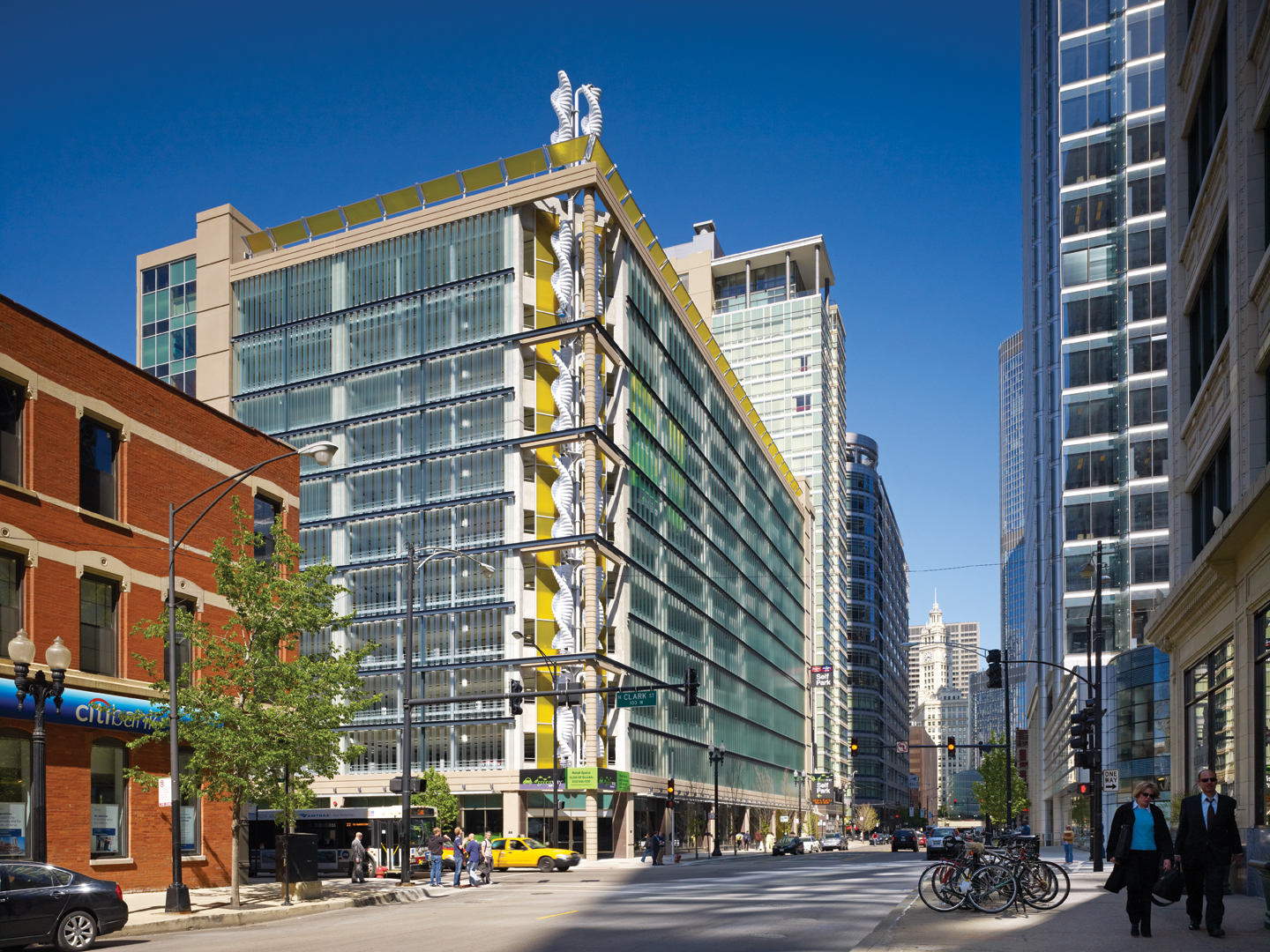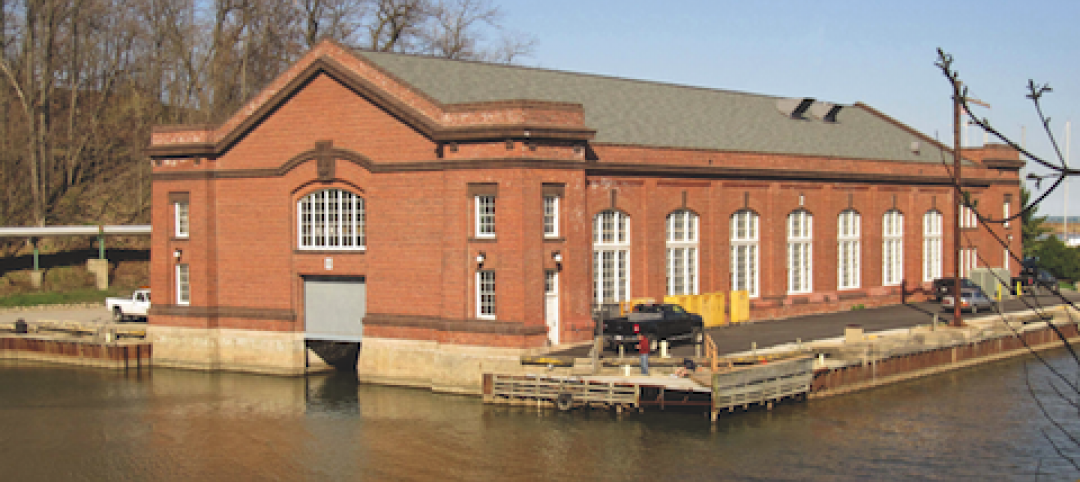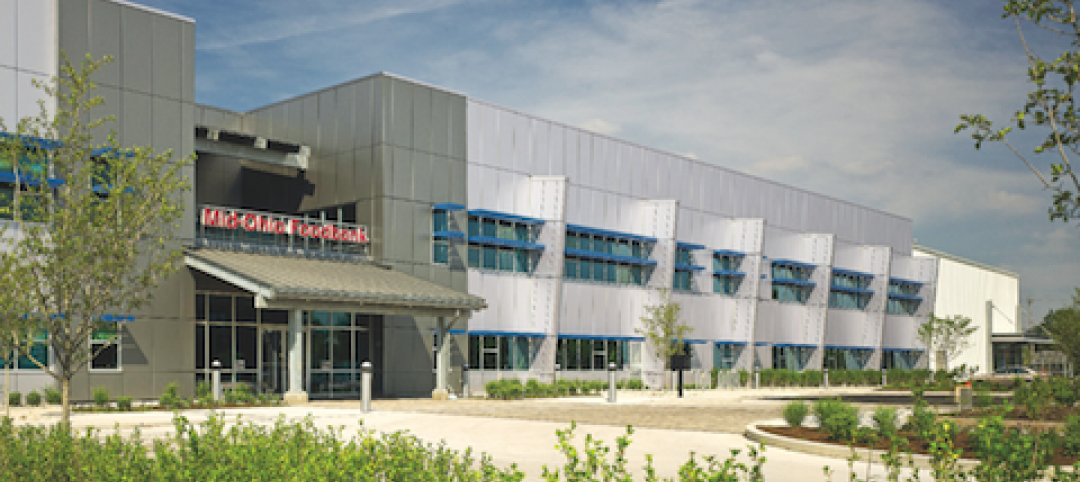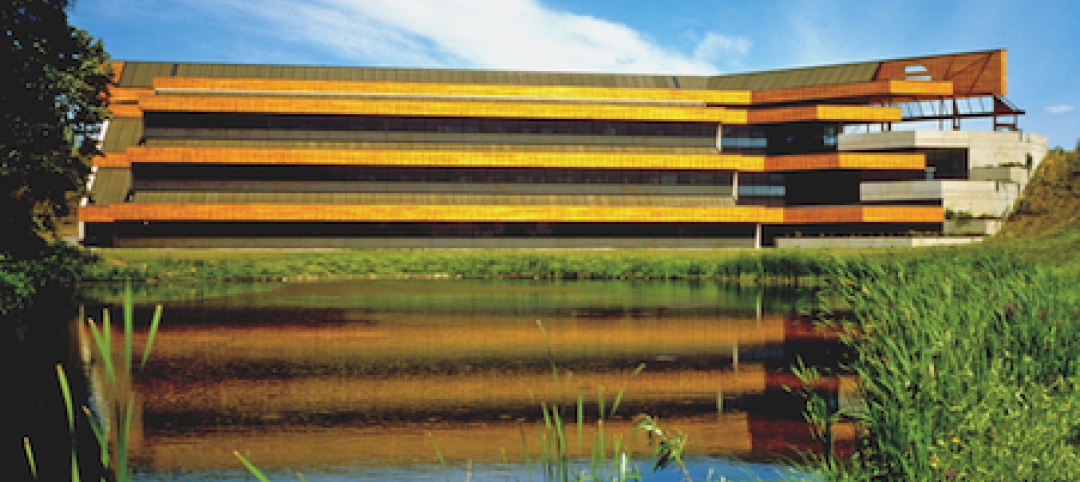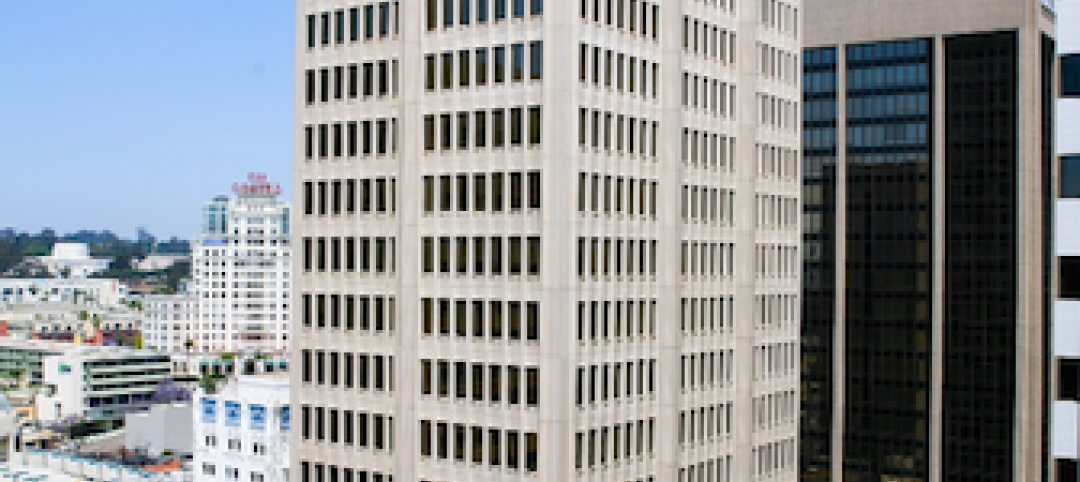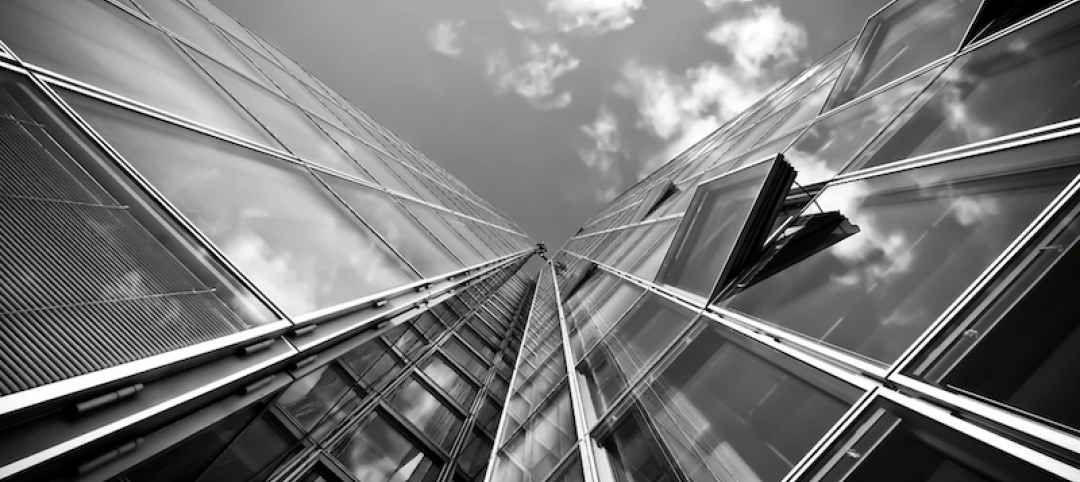The Greenway Self-Park in Chicago’s River North neighborhood shines like a beacon of enlightened green design on a block crowded with office and residential towers. The 285,000-sf parking structure’s green-tinted glass exterior doubles as a ventilation and daylighting system. Its signage gives parkers tips on how to live greener. River North developer Friedman Properties is planning a residential tower next door so that the parking garage’s green roof can serve as a garden for future condo owners.
What sets the 800-car parking structure apart, however, is its 12-paired array of wind turbines. The vertical axis turbines, manufactured by Helix Wind, Poway, Calif., are positioned on the southwest corner of the building near the relatively wide corridor of Clark Street, a busy thoroughfare. Todd Halamka, director of design at the Chicago office of HOK and lead designer on the project, calls the turbines “a kinetic and functional sculpture piece.”
Weather data from collection stations at O’Hare and Midway airports and weather buoys off of Chicago’s lakefront, coupled with wind tunnel tests taken from nearby buildings, were used to evaluate the amount of wind that could be harvested from the site. Estimates by the Building Team put the average wind at that corner at 10 mph at grade level over a year, which, according to the manufacturer, should be sufficient to generate electricity for the structure. The turbines, which extend from the second story to the very top of the structure on the southwest corner of the building, should generate enough power to light the building’s exterior and still send some energy back to the grid through the structure’s reversible electricity meter, Halamka said.
The first day I visited the site there was a strong breeze blowing in from the southwest and the long helical blades of the turbines, shaped from corrugated metal, appeared to be rotating quite actively. On another less windy day, however, they did not appear to be moving at all. Because the parking facility has only been open since September, not enough reliable data has been collected on how much power the turbines have generated.
The Building Team of designers HOK/Cubellis and general contractor Bovis Lend Lease took extra steps to green the parking structure. Greenway Self-Park’s signage gives garage users tips on living more sustainably. Each floor has a different nature theme, such as water, air, and earth conservation. The garage has electric-car charging stations and priority parking for hybrid gas/electric vehicles and for Zipcar and I-Go car-sharing vehicles. Its planned green roof has rainwater cisterns for water collection. Almost all of the building materials were locally sourced. Light sensors control the building’s interior lights and shut them off if enough daylight is coming through the translucent glass-walled exterior.
HOK says the building is registered with LEED and is currently in the commissioning process. “Rather than design a traditional closed garage which has an MEP system and has to run 24/7, working with the city of Chicago we were successful in creating a naturally ventilated garage,” Halamka said. Each floor maintains at least 20% open exterior wall area that provides natural ventilation. “We varied the openings (on the channel glassed walls) so that the glass panels have different spacing that creates a subtle visual tapestry, so that each façade takes advantage of the natural light and air,” he said.
As Chicago’s River North neighborhood continues to develop, Halamka says he believes a more sustainable urban strategy would be to build out the surrounding surface parking lots with ground-floor retail capped with office and residential space and then condense the parking into a more vertical arrangement that promotes local live-work opportunities. “Cars are an inevitable means of transportation,” said Halamka. “It is how we choose to live and use our vehicles in a more sustainable lifestyle that is important.”
For now, building-mounted wind harvesting like that at Greenway Self-Park is still in its infancy. HOK says both its Chicago office and building owner Friedman Properties are committed to monitoring exactly how much energy the wind turbines at the Greenway Self-Park are generating two years from now, when there will be enough data to gauge actual production. BD+C
Related Stories
| Oct 12, 2010
Building 13 Naval Station, Great Lakes, Ill.
27th Annual Reconstruction Awards—Gold Award. Designed by Chicago architect Jarvis Hunt and constructed in 1903, Building 13 is one of 39 structures within the Great Lakes Historic District at Naval Station Great Lakes, Ill.
| Oct 12, 2010
Full Steam Ahead for Sustainable Power Plant
An innovative restoration turns a historic but inoperable coal-burning steam plant into a modern, energy-efficient marvel at Duke University.
| Oct 12, 2010
From ‘Plain Box’ to Community Asset
The Mid-Ohio Foodbank helps provide 55,000 meals a day to the hungry. Who would guess that it was once a nondescript mattress factory?
| Oct 11, 2010
HGA wins 25-Year Award from AIA Minnesota
HGA Architects and Engineers won a 25-Year Award from AIA Minnesota for the Willow Lake Laboratory.
| Oct 11, 2010
MBMA Releases Fire Resistance Design Guide for metal building systems
The Metal Building Manufacturers Association (MBMA) announces the release of the 2010 Fire Resistance Design Guide for Metal Building Systems. The guide provides building owners, architects, engineers, specifiers, fire marshals, building code officials, contractors, product vendors, builders and metal building manufacturers information on how to effectively meet fire resistance requirements of a project with metal building systems.
| Oct 11, 2010
Rhode Island is the first state to adopt IGCC
Rhode Island is the first state to adopt the International Green Construction Code (IGCC). The Rhode Island Green Buildings Act identifies the IGCC as an equivalent standard in compliance with requirements that all public agency major facility projects be designed and constructed as green buildings. The Rules and Regulations to implement the Act take effect in October 2010.
| Oct 8, 2010
Union Bank’S San Diego HQ awarded LEED Gold
Union Bank’s San Diego headquarters building located at 530 B Street has been awarded LEED Gold certification from the Green Building Certification Institute under the standards established by the U.S. Green Building Council. Gold status was awarded to six buildings across the United States in the most recent certification and Union Bank’s San Diego headquarters building is one of only two in California.
| Oct 6, 2010
Windows Keep Green Goals in View
The DOE's National Renewable Energy Laboratory has almost 600 window openings, and yet it's targeting LEED Platinum, net-zero energy use, and 50% improvement over ASHRAE 90.1. How the window ‘problem’ is part of the solution.
| Oct 6, 2010
From grocery store to culinary school
A former West Philadelphia supermarket is moving up the food chain, transitioning from grocery store to the Center for Culinary Enterprise, a business culinary training school.
| Sep 30, 2010
Luxury hotels lead industry in green accommodations
Results from the American Hotel & Lodging Association’s 2010 Lodging Survey showed that luxury and upper-upscale hotels are most likely to feature green amenities and earn green certifications. Results were tallied from 8,800 respondents, for a very respectable 18% response rate. Questions focused on 14 green-related categories, including allergy-free rooms, water-saving programs, energy management systems, recycling programs, green certification, and green renovation.


